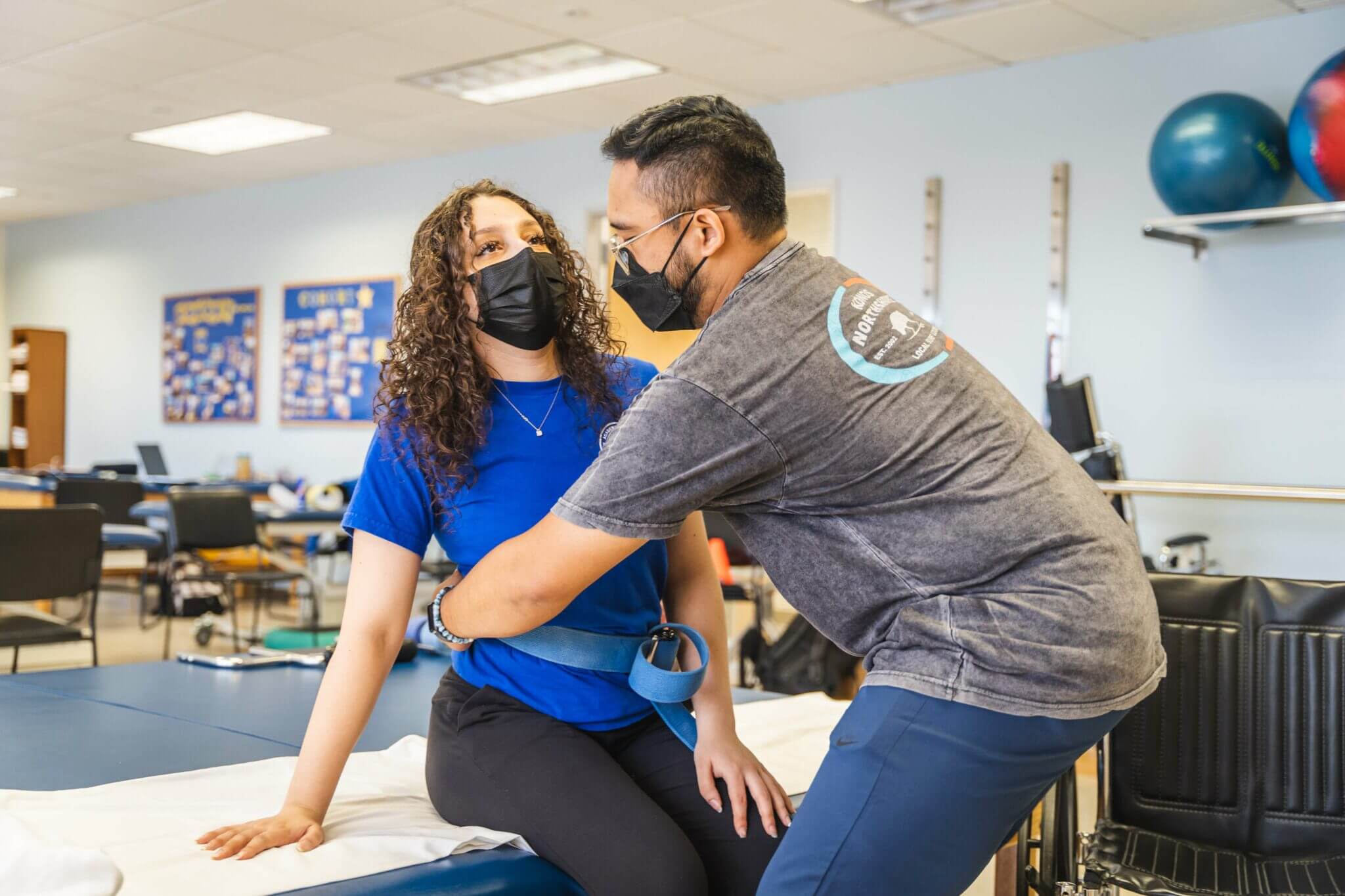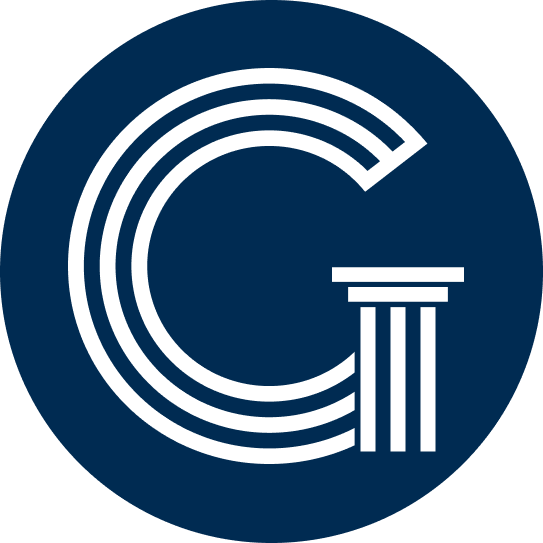PTA 100 – Introduction to Physical Therapist Assistant — 22 Clock Hours/2 Quarter Credit Hours
Prerequisites: None
This course introduces the Physical Therapist Assistant’s role and scope of practice. Emphasis will be placed on educational preparation, a historical overview of physical therapy in the healthcare system, professional affiliations, the structure and function of physical therapy services, ethical and legal issues in healthcare, documentation, and communication. This course also includes a self-study program in medical terminology and HIPAA regulations training.
PTA 110 – Fundamental PTA Procedures with Lab — 77 Clock Hours/4.5 Quarter Credit Hours
Prerequisites: None
This course begins with patient handling skills and the continuation of documentation. Students practice and develop skills in gathering data for documentation necessary to assess patient response to physical therapy while under the direction and supervision of a physical therapist. Students will acquire data collection skills, tests and measurements, patient handling, assistive devices, guarding, transfers, and motion range.
PTA 120 – Clinical Kinesiology with Lab — 77 Clock Hours/4.5 Quarter Credit Hours
Prerequisites: None
This course provides knowledge of the principles of mechanics and musculoskeletal anatomy and how they relate to human motion and the field of physical therapy. The concepts of locomotion, forces, and levers are introduced. Topics include muscle origins and insertions, and actions. Laboratory experiences correlate to the lectures and include manual muscle testing and goniometry. Students will be expected to achieve competency on a given list of skills. Part 1 covers the lower extremity. Part II covers the upper extremity. This course is aligned by body system with PTA 220.
PTA 130 – Pathology — 44 Clock Hours/4 Quarter Credit Hours
Prerequisites: None
This course provides knowledge of disease processes, systemic disorders, guidelines, precautions, and contraindications for physical therapy interventions.
PTA 210 – Procedures II with Lab — 66 Clock Hours/4 Quarter Credit Hours
Prerequisites: None
Lab PT Modalities – Physical Agents – Massage – Soft Tissue Interventions: This course introduces using and applying physical agents, soft tissue interventions, and electrotherapies in physical therapy. The practice of treatment techniques is emphasized through laboratory time. Students will be expected to achieve competency on a given list of skills.
PTA 220 – Orthopedic Management — 66 Clock Hours/4 Quarter Credit Hours
Prerequisites: None
This course prepares the PTA student to address orthopedic-related conditions commonly seen in Physical Therapy. Basic exercise principles and their application are covered with laboratory discussion, demonstration, and practice. Students will be expected to achieve competency on a given list of skills. Part 1 covers the lower extremity. Part II covers the upper extremity. This course is aligned by body system with PTA 120.
PTA 222 – Patient Care Skills I — 22 Clock Hours/1 Quarter Credit Hour
Prerequisites: None
This lab course emphasizes the practical combination of patient pathologies covered in concurrent and previous courses. Students develop interventions from case scenarios and plans of care. Group participation and student-to-student assistance fostering communication and independence are encouraged to prepare for the clinical experience. Students develop clinical problem-solving skills in orthopedic conditions, modalities, patient handling, therapeutic exercise, and presented pathologies. Students will be expected to achieve competency on a given list of skills.
PTA 225 – Clinical Education I — 184 Clock Hours/6 Quarter Credit Hours
Prerequisites: None
This is the first integrated clinical experience designed to allow the student to further their exposure to physical therapy practice in the clinical environment and apply those skills that the student has tested proficiency in before the clinical experience and that the Clinical Instructor deems appropriate. Students will be at the clinical facility full-time for four (4) weeks and three (3) days.
PTA 226 – Clinical Education I Seminar — 11 Clock Hours/1 Quarter Credit Hour
Prerequisites: None
This course includes case study presentations and a review of the first full-time clinical experience, including billing, reimbursement, and discharge planning.
PTA 230 – Professional Behaviors — 33 Clock Hours/3 Quarter Credit Hours
Prerequisites: None
This course introduces the concept of a multicultural society and how it plays an increased role in the physical therapy clinic. Topics include cross-cultural communication skills, the psychology of disability, health disparities between populations, age differences, ethics, values, and professional development within the healthcare system.
PTA 233 – Patient Care Skills II — 22 Clock Hours/1 Quarter Credit Hour
Prerequisites: None
This lab course addresses the more complex patient. Case scenarios develop problem-solving skills in applying interventions following the supervising physical therapist’s Plan of Care. Concentration is on the progression and regression of exercises in response to patient performance.
Case studies will demonstrate the PT/PTA relationship and the PTA’s responsibility for the Plan of Care. Group participation and student-to-student assistance fostering communication and independence are encouraged to prepare for the clinical experience.
PTA 235 – Clinical Education II — 240 Clock Hours/8 Quarter Credit Hours
Prerequisites: None
This is the second integrated clinical experience designed to allow the student to further their exposure to physical therapy practice in the clinical environment and apply those skills that the student has tested proficiency in before the clinical experience and that the Clinical Instructor deems appropriate. Students will be at the clinical facility full-time for six (6) weeks.
PTA 240 – Applied Neurology — 66 Clock Hours/4 Quarter Credit Hours
Prerequisites: None
This course builds on neurologically based disabilities commonly seen in physical therapy practice across the lifespan. Common therapeutic interventions for rehabilitation are practiced. The chronic nature of neurologic conditions and their effect on the individual’s life will be addressed as they affect physical therapy. Students will be expected to achieve competency on a given list of skills.
PTA 245 – Clinical Education III — 280 Clock Hours/9 Quarter Credit Hours
Prerequisites: None
This is the third and terminal clinical experience designed to allow the student to further their exposure to physical therapy practice in the clinical environment and apply those skills that the student has tested proficiency in before the clinical experience and that the Clinical Instructor deems appropriate. Students will be at the clinical facility full-time for seven (7) weeks.
PTA 250 – Physical Therapy Aspects of Growth, Development — 44 Clock Hours/3 Quarter Credit Hours
Prerequisites: None
This course covers relevant topics and interventions that deal with delivering physical therapy services across the lifespan, including the aging population as a normal process and the common pathologies associated with aging—emphasis on Cardiovascular and Respiratory conditions, fall prevention, and wound care.
PTA 260 – Selected Topics — 44 Clock Hours/3 Quarter Credit Hours
Prerequisites: None
This course comprises selected physical therapy topics to complement prior coursework and required content in prosthetics and genitourinary conditions. Additional clinical topics may include vestibular, chronic pain, taping, ergonomics, and other contemporary issues encountered in physical therapy delivery systems.
PTA 280 – Senior Seminar — 33 Clock Hours/3 Quarter Credit Hours
Prerequisites: None
This course brings full circle the educational and clinical experience for the PTA student. Each student will demonstrate the PTA as an educator by presenting a teaching unit related to an area of interest to prepare for the in-service required during the final clinical experience. Students will explore the effective delivery of physical therapy services. Psychomotor, cognitive, affective, treatment approaches, communication, and documentation will be discussed regarding patient care.
Additional topics pertinent to an entry-level PTA will be presented. These include employment issues, continued professional development, the licensure application process, exam preparation strategies, and a review of California PT Practice Acts and Rules and Regulations.
PTA 290 – Licensure Exam Preparation — 22 Clock Hours/2 Quarter Credit Hours
Prerequisites: None
This course is designed to review information and testing that will aid the student in preparation to take the NPTE for licensure as a PTA in California. A 16-hour workshop is facilitated by an outside educational company specializing in PTA exam preparation.


